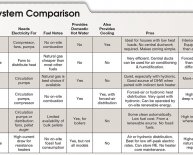
Most efficient heat source
For climates with moderate cooling and heating needs, heat pumps offer an energy-efficient substitute for furnaces and ac units. Like your refrigerator, heat pumps use electricity to go temperature from a cool area to a warm space, making the cool space cooler together with hot space hotter. Through the heating season, temperature pumps move temperature from cool outdoors into your cozy home and during the air conditioning period, temperature pumps move temperature from your own cool home in to the cozy in the open air. Since they move temperature instead of generate temperature, temperature pumps provides comparable space conditioning at as low as one-quarter of cost of operating main-stream heating or air conditioning devices.
There are three types of heat pumps: air-to-air, liquid supply, and geothermal. They collect temperature from the air, liquid, or surface outside your home and focus it for use inside.
The most frequent particular temperature pump could be the air-source heat pump, which transfers temperature betwixt your house in addition to outside environment. Today's heat pump can reduce your electrical energy usage for heating by about 50per cent when compared with electric resistance warming particularly furnaces and baseboard heating units. High-efficiency temperature pumps in addition dehumidify much better than standard main air conditioners, leading to less energy usage and much more cooling convenience in summer months. Air-source heat pumps have-been employed for a long time in nearly all parts of the usa, but until recently they will have not been used in places that practiced extended durations of subfreezing temperatures. But recently, air-source temperature pump technology features advanced such that it now provides a legitimate room heating alternative in cooler areas.
For homes without ducts, air-source temperature pumps can also be found in a ductless variation called a mini-split heat pump. Also, a special types of air-source temperature pump labeled as a "reverse cycle chiller" generates hot and cold-water in the place of atmosphere, letting it be used with vibrant flooring home heating systems in heating mode.
Geothermal (ground-source or water-source) heat pumps achieve higher efficiencies by moving temperature between home and the surface or a nearby water supply. Even though they cost more to install, geothermal heat pumps have actually low running costs since they make use of fairly continual floor or liquid temperatures. Geothermal (or floor resource) temperature pumps have some significant benefits. They are able to lower energy usage by 30%-60percent, control humidity, tend to be sturdy and dependable, and easily fit into a multitude of homes. Whether a geothermal heat pump is suitable available will depend on how big is your lot, the subsoil, and landscape. Ground-source or water-source temperature pumps can be utilized in more extreme climates than air-source heat pumps, and customer care with all the systems is very large.
An innovative new particular temperature pump for domestic systems could be the absorption temperature pump, also referred to as a gas-fired temperature pump. Absorption heat pumps utilize heat as their power source, and that can be driven with numerous heat resources.
















